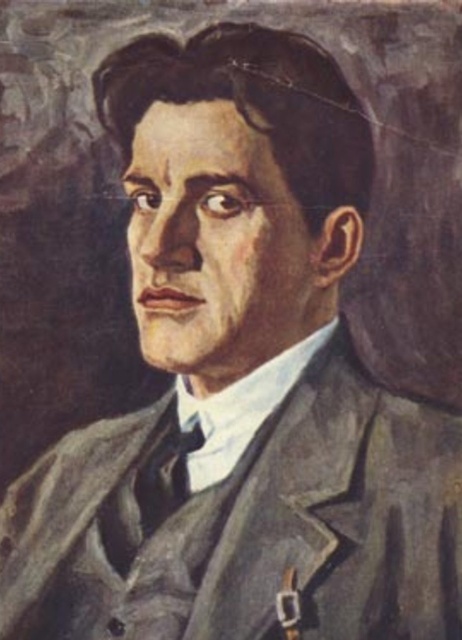Poetry
Besides many musical themes, Bulgakov also presents lines of poetry in The Master and Margarita. Sometimes they are quoted by the characters, sometimes they are heard in the background. The poems they come from are written by Aleksander Sergeevich Pushkin (1799-1837), without any doubt the most popular Russian poet ever, and by Vladimir Vladimirovich Mayakovsky (1893-1930), a contemporary of Bulgakov with whom he had a love-hate relationship.
Jubilee
Vladimir Vladimirovich Mayakovsky - 1924
At the end of chapter 6 of The Master and Margarita, the poet Riukhin has a dispute with the statue of Pushkin. By the text «Is there anything special in the words: 'The snowstorm covers'...? I don't understand!», Bulgakov makes very clear who is the prototype of Riukhin. It's Vladimir Mayakovsky who, in 1924, for the celebration of the 125th anniversary of Pushkin's birth, wrote the poem Jubilee in which he took Pushkin from his pedestal on Tverskaya bulvar at night and shared his opinions with him during a walk through the city.
Winter evening
Aleksander Sergeevich Pushkin - 1825
In the abovementioned quote, Riukhin used the words «The snowstorm covers…» It's the opening line of the poem Winter evening (1825), one of Pushkin's best known poems.
Back home
Vladimir Vladimirovich Mayakovsky - 1925
In chapter 13, when the master tells his story to Ivan, he uses the words «slanting rain». The image of the slanting rain comes from the poem Back home! by Vladimir Mayakovsky. Bulgakov must have known it from its magazine publication in 1926. When the poet compiled it later, he deleted the last lines, probably the best of the poem, on the advise of his friend Osip Maksimovich Brik (1888-1945). They read as follows:
I want understanding of my country, nothing more.
And what
if understanding fails to come?
Then I pass in vain
its territory
just like rain
passes over slanting!

Vladimir Vladimirovich Mayakovsky
The Covetous Knight
Aleksander Sergeevich Pushkin - 1830
In the dream of Nikanor Ivanovich - chapter 15 of the novel - the actor Kurolesov declames a fragment of The Covetous Knight, also called The Miserly Knight, written by Aleksander Sergeevich Pushkin (1799-1837). It's about the demonic and destructive fascination of gold. A not so nice father - the baron - refuses to help his son - Albert - although he can afford it. Pushkin had similar problems with his father. The baron and Albert are about to fight a duel, which could be averted at the last moment. But the baron dies soon after that - from a natural cause.
This little tragedy was used by Sergei Vassilevich Rachmaninoff in 1905 as a libretto for his opera of the same name.
Queen of Spades
Aleksander Sergeevich Pushkin - 1833
Still in chapter 15, a nervous tenor was heard in the darkness, singing from far away:
«There great heaps do shine
and all those heaps of gold are mine.»
These lines come from the verse story Queen of Spades written by Aleksander Sergeevich Pushkin (1799-1837). It's about the destructive aspects of addiction to gambling. Herman is an army officer who manipulates the naive Lisa. She is the granddaughter of a countess known as the Queen of Spades. The countess knows «the secret of the three cards» and told it to two men. If she told it to a third one, she would die. Herman is obsessed to know the secret which costs him his posessions, Lisa and eventually his own life.
In 1890, Pyotr Ilyich Tchaikovsky (1840-1893) wrote an opera based on the story of Pushkin. The libretto was written by the composer's brother Modest Ilyich Tchaikovsky (1850-1916). The latter made some changes to the story to make it more suitable for an opera.




